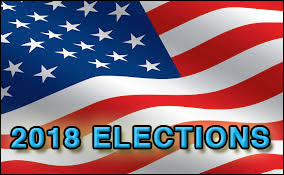By Jim Ellis
Jan. 27, 2017 — Rep. Lynn Jenkins bows out of politics, opening up the KS-2 congressional district, and Rep. Mike Pompeo’s confirmation as CIA director under President Trump opens up the KS-4 congressional district. Here’s a look at how those openings are expected to play out:
KS-2
It was expected that five-term Kansas Rep. Jenkins (R-Topeka) would not seek re-election in 2018, but her actual announcement contained a surprise. Most politicos believed Rep. Jenkins would enter the open governor’s campaign, but that will not be the case.
The congresswoman did, in fact, announce that she will leave the House at the end of the current term, but will not be running for governor or any other office. Jenkins intends to return to the private sector after completing her final term in Congress.
Gov. Sam Brownback (R) is ineligible to seek a third term, and a great many names have been mentioned as potential statewide candidates. Now that Rep. Jenkins will not be a gubernatorial contender, the race to succeed Brownback becomes even more wide open. Lt. Gov. Jeff Colyer (R), Attorney General Derek Schmidt (R), and Secretary of State Kris Kobach (R) are attracting attention as prospective candidates. For the Democrats, 2014 gubernatorial nominee Paul Davis, the former state House minority leader, resides in this district and could potentially become a congressional candidate.
CD-2 lies in eastern Kansas, stretching in a north-south direction from Nebraska to Oklahoma. The two largest population centers are the capital city of Topeka and Lawrence, the home of Kansas University. The seat is reliably Republican but has elected Democrats from time to time. President Trump carried the 2nd, 56-37 percent. Four years ago, Mitt Romney out-polled then-President Obama, 56-42 percent.
Once this open seat race takes shape, the eventual Republican nominee will be viewed as a strong favorite, but a Democratic wave year, if such were to form, could potentially make this open seat race competitive.
KS-4
Since Rep. Pompeo (R-Wichita) immediately resigned his congressional seat upon being confirmed as President Trump’s CIA Director earlier in the week, Gov. Brownback (R) scheduled the replacement election for Tuesday, April 11. The two parties will determine for themselves how their nominees will be chosen, but it will be through an internal party procedure that must be completed by Feb. 18.
The Republicans have already announced that the 126-member 4th District Republican Committee will choose the special election nominee. The eventual GOP candidate will likely be a prohibitive favorite to win in April. Democrats have not yet announced their nomination structure.
The 4th is a strongly Republican seat. President Trump scored a 60-33 percent victory here over Hillary Clinton. In 2012, Mitt Romney’s victory margin over then-President Obama was 62-36 percent.
In anticipation of the special election, several individuals have already announced their candidacies, including former US Rep. Todd Tiahrt (R). Also petitioning the Republican committee members are state Treasurer Ron Estes, Wichita City Councilman Pete Meitzner, former radio talk show host Joseph Ashby, petroleum company CEO George Bruce, and Trump Transition Team member Alan Cobb.
For the Democrats, former state Treasurer Dennis McKinney and international relations consultant Laura Lombard are the two most prominent announced candidates.
Kansas’ largest city, Wichita, anchors the 4th District that occupies the south-central region in the state, just along the Oklahoma border. Much more will develop on this special election now that the vacancy is official, and with a newly defined short election cycle.
 The US Supreme Court declined to hear the Pennsylvania Republicans’ arguments earlier this week to move the live redistricting case to the federal level. To review, the Pennsylvania Supreme Court ruled the current congressional map a political gerrymander, but without citing any election law statute violations. State Senate Republicans are refusing to provide the court with their requested data until the legislative bodies are informed about what is legally wrong with the current map.
The US Supreme Court declined to hear the Pennsylvania Republicans’ arguments earlier this week to move the live redistricting case to the federal level. To review, the Pennsylvania Supreme Court ruled the current congressional map a political gerrymander, but without citing any election law statute violations. State Senate Republicans are refusing to provide the court with their requested data until the legislative bodies are informed about what is legally wrong with the current map. 
